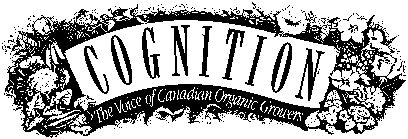

Cognition Index | Virtual Library
| Magazine Rack
Search
| Join the Ecological Solutions Roundtable
GET BACK TO BASICS WITH HERBS
by Debbie Luce
We are slowly rediscovering the pleasure and usefulness of herbs in our gardens and in our kitchens. In the garden, herbs act as excellent companion plants. They are also a source of beauty and nutrition and often provide us with simple remedies in the form of kitchen medicine. Everywhere culinary herbs are being reintroduced into our diets as people search for tastier, healthier food. Herb teas provide us with a wide range of noncaffeinated beverages which can be invigorating or soothing.;
The term 'herb' can be used to describe any plant with aromatic, culinary or medicinal qualities.
Aromatic: Herbs in the garden are valuable companion plants. Basil planted with tomatoes is said to improve their flavor and deter some tomato pests. Borage is a good addition to the orchard or alongside the strawberry patch as it provides organic potassium, calcium and minerals; just watch that it does not take over as it prolifically reseeds itself. Catnip discourages flea beetles and insect-repellent tea can be made of the leaves. Chives are valuable in the orchard and in the rose garden as an insect repellent. Dill has been found beneficial when planted alongside cabbage and other cole crops. Coriander is said to repel aphids. Marigolds (French and Mexican) deter nematodes. Mint deters ants and flea beetles. Many aromatic herbs have insect-repelling qualities and are a good addition to the vegetable garden. Some combinations should be avoided, though, such as radishes with the hyssop family, and dill and fennel with carrots. Many herb and organic gardening books contain sections on companion planting, and indeed whole books have been written on this subject alone.
Culinary: The use of fresh culinary herbs is on the increase as people look for more natural ways to flavor food. Common culinary herbs such as basil, chives, dill, thyme, parsley and mint are easy to grow and add flavor and nutrition to many basic recipes. Herbs from the garden are best used fresh as they contain essential oils which are quite volatile and tend to lose their flavor with age. They should be picked in the morning of a dry day after the dew has evaporated, washed quickly and sparingly, then dried (a salad spinner works well) and stored in a clean, dry, air-tight glass jar in the refrigerator. Most herbs harvested for their leaves are picked just before the plant flowers for optimum flavor. Many herbs can be dried simply by tying them in small bunches and hanging them in a dark, dry place for a couple of weeks. When they are crisp to the touch, the leaves can be stripped from the stems and stored in an airtight container in a cupboard away from a source of heat. It is best not to crush dried herb leaves before storing them because this releases the oils which contain the flavor. Crush them just before using in a recipe.
Medicinal: Herbs are very useful in everyday kitchen medicine. Many herbs (some now considered garden weeds) are valuable blood purifiers and general tonics. These are often the first plants to appear in the spring, such as dandelions, stinging nettles (the sting goes away when cooked or steeped into tea), lovage and parsley. Some herbs commonly used in the form of healing teas are sage for sore throats; feverfew, rosemary and lemon balm for headaches; fennel for colicky babies; ginger for nausea; chamomile for upset stomach and general nervousness; and mint for aiding digestion. There are many more medicinal uses for common herbs and many books on the market on this subject. A note of caution: it is always best to consult with an experienced herb grower/user when taking medicinal herb teas regularly. It is important to understand the powers of these plants and to respect them.
Most people know of a basil pesto recipe and are aware that dill is the essential pickling herb, but how about an omelette with cheddar cheese and lovage or a soothing tea of lemon balm or lemon bergamot? You can experiment and test your taste buds with many varieties of herbs that grow locally. Try visiting your local farmers’ market to discover the variety and knowledge that local herb growers offer!
W
Debbie Luce is a COG Ottawa member and volunteer. She operates an organic herb business, Herbs for all Seasons, and is associated with the Metcalfe Farmers’ Market.
Copyright © 1995.
Debbie LuceReprinted with permission. All rights reserved.
Info Request | Services | Become EAP Member | Site Map
Give us your comments about the EAP site
Ecological Agriculture Projects, McGill University (Macdonald
Campus)
Ste-Anne-de-Bellevue, QC, H9X 3V9 Canada
Telephone:
(514)-398-7771
Fax:
(514)-398-7621
Email: info@eap.mcgill.ca
To report problems or otherwise comment on the structure of this site, send mail to the Webmaster